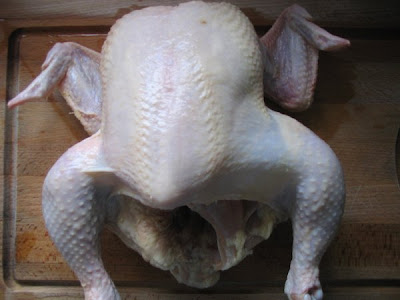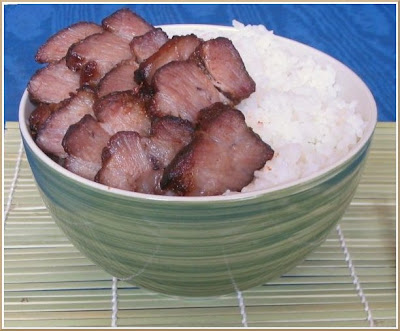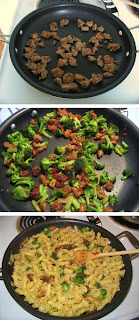There are a few benefits to cutting up a whole chicken yourself as opposed to buying the parts separately. You can save some money since whole chickens cost less, you have better control over how your chicken is butchered, and the scraps can be kept for chicken stock. To do this, you’ll need a large cutting board with a gutter for the juices, a sharp chef’s knife, and a pair of kitchen shears. For further deboning (for example for deboning a chicken breast) a boning knife gives you more control and maneuverability. With a bit of practice, a whole chicken can be done in less than 5 minutes, but always be careful!
Disclaimer: This guide contains multiple pictures of chickens and chicken parts, so if you are uncomfortable with seeing this, please don't read the rest of the guide.
Wash the chicken and remove the giblets. Save the neck for stock.

Lay the chicken breast up on your cutting board with wings closest to you (the above picture the wings are away from me so I turned the chicken 180 degrees). To separate the wings, cut a little bit into the breast to expose the wing joint. Here in the picture you can see the wing joint.

Once you can see the wing joint, pull the wing back so you expose more of the joint and see better. Then cut through the joint.

Repeat for other wing and now you have 2 whole wings. Cut the wingtip off and reserve for stock.

Cut through the second joint to separate the wingette and drummette. You can save these for buffalo wings or other dishes.

The legs are attached to the body of the chicken only by the leg joint and some skin and connective tissue. Sometimes the body is already starting to separate from the legs so just cut through the skin. The red circled area highlights where you should cut on the skin. You can see on my chicken the legs are already very separated from the body.

Once you cut through the skin, pry the leg away from the body.

Then bend the leg back to pop out the leg joint.

Cut through this joint but cut as close to the backbone as possible, you don't want to lose the tasty thigh meat, and now you have a leg quarter. Repeat for the other leg.

Flip the leg quarter over, skin side down. You’ll notice a line of fat, this line separates the drumstick from the thigh. Cut down to expose the joint, then cut through the joint and now you have a drumstick and thigh. Repeat for the other leg.

Now turn the chicken over, breast side down.

Using kitchen shears, cut out the backbone. Kitchen shears are much safer for this than a knife because a knife can slip. Save the back bone with the neck and wing tips for stock.

Now you have a bone in chicken breast. Skin side down, cut the breast in half for 2 chicken breasts. You can use a cleaver or a chef’s knife. You’ll need to cut through some bone; this is the most difficult part, so be careful! Now you have 2 bone in, skin on chicken breasts.

(my camera ran out of batteries here)
For further boning, use a small boning knife and make cuts as close to the breastbone as possible to debone the chicken breasts. Remove the skin and now you have 2 boneless skinless chicken breasts.
*a note about chicken breasts: There is a smaller muscle that is attached to the chicken breast, the tenderloin muscle. Sometimes this part tends to fall off from the rest of the breast. This is okay, for example when you're preparing chicken cutlets it's best to remove this piece and save it for stir fry or something else because it usually comes off when you pound the chicken breast.
After you are done cutting up the chicken, wash your cutting board and all other equipment with hot soapy water, then disinfect it with a solution of dilute bleach. This is the best way to kill all the bacteria.
Links:
Cutting up whole chicken at Cooking for Engineers.
Disclaimer: This guide contains multiple pictures of chickens and chicken parts, so if you are uncomfortable with seeing this, please don't read the rest of the guide.
Wash the chicken and remove the giblets. Save the neck for stock.

Lay the chicken breast up on your cutting board with wings closest to you (the above picture the wings are away from me so I turned the chicken 180 degrees). To separate the wings, cut a little bit into the breast to expose the wing joint. Here in the picture you can see the wing joint.

Once you can see the wing joint, pull the wing back so you expose more of the joint and see better. Then cut through the joint.

Repeat for other wing and now you have 2 whole wings. Cut the wingtip off and reserve for stock.

Cut through the second joint to separate the wingette and drummette. You can save these for buffalo wings or other dishes.

The legs are attached to the body of the chicken only by the leg joint and some skin and connective tissue. Sometimes the body is already starting to separate from the legs so just cut through the skin. The red circled area highlights where you should cut on the skin. You can see on my chicken the legs are already very separated from the body.

Once you cut through the skin, pry the leg away from the body.

Then bend the leg back to pop out the leg joint.

Cut through this joint but cut as close to the backbone as possible, you don't want to lose the tasty thigh meat, and now you have a leg quarter. Repeat for the other leg.

Flip the leg quarter over, skin side down. You’ll notice a line of fat, this line separates the drumstick from the thigh. Cut down to expose the joint, then cut through the joint and now you have a drumstick and thigh. Repeat for the other leg.

Now turn the chicken over, breast side down.

Using kitchen shears, cut out the backbone. Kitchen shears are much safer for this than a knife because a knife can slip. Save the back bone with the neck and wing tips for stock.

Now you have a bone in chicken breast. Skin side down, cut the breast in half for 2 chicken breasts. You can use a cleaver or a chef’s knife. You’ll need to cut through some bone; this is the most difficult part, so be careful! Now you have 2 bone in, skin on chicken breasts.

(my camera ran out of batteries here)
For further boning, use a small boning knife and make cuts as close to the breastbone as possible to debone the chicken breasts. Remove the skin and now you have 2 boneless skinless chicken breasts.
*a note about chicken breasts: There is a smaller muscle that is attached to the chicken breast, the tenderloin muscle. Sometimes this part tends to fall off from the rest of the breast. This is okay, for example when you're preparing chicken cutlets it's best to remove this piece and save it for stir fry or something else because it usually comes off when you pound the chicken breast.
After you are done cutting up the chicken, wash your cutting board and all other equipment with hot soapy water, then disinfect it with a solution of dilute bleach. This is the best way to kill all the bacteria.
Links:
Cutting up whole chicken at Cooking for Engineers.






























